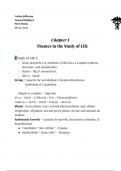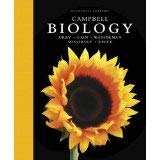Ceniya Jefferson
General Biology I
Prof. Weeks
08-24-2023
Chapter I
Themes in the Study of Life
( Study of Life )
- Some properties or attributes of life have a complex pattern,
structure, and organization.
- Macro - Big & zoomed out.
- Micro - Small
Living : Capacity for metabolism ( Chemical Reactions )
Anabolism & Catabolism
^ ^
Simple to complex Opposite
6Co2 + 6H2O → C6H12O6 + 6O2 → Photosynthesis
C6H1202 -> 6CO2 + 6H2O + Energy -> Inverse
Plants : Green plants carry on both photosynthesis and cellular
respiration. All plants, not just green plants, do one and animals do
another.
Embryonic Growth - Capacity for growth, Reaction to stimulus, &
Reproduction
● Unicellular,” One cell big “ - Fungus
● Multicellular “ Many cells “ - Humans
, ● Order ( Biosphere,Ecosystem,Communities, Population, Organisms,
Organs & Organ Systems, Tissues,Cells, Organelles, Molecules,to
Atoms )
● Animals Classification Order ( Dear, King, Philip,Came, Over, For,
Green Spaghetti ) Domain, Kingdom, Phylum,Class, Order, Family,
Genus, and Species
● Creator - Carlos Linnaeus Latin Name : Carl von Linne GERMAN
● Genus name - always capitalized
KEY - Form & Function / The Basic Unit of Structure and Function
Domains ( 3 ) Bacteria, Archaea, and Eukarya
^ ^ ^
Prokaryotic, No nucleus but nucleoid, Also Bacteria & Prokaryotic, no special
molecules for props, extreme environments
( Eukarya )
- Eukaryotic
- No circular DNA
- DNA is always found in nucleus as two for more chromosomes
Kingdoms of Eukarya
Protists :
- Eukaryotic
- Lack tissue differentiation
- Not a kingdom to itself
- Classification under debate
Fungi :
- Eukaryotic
- Includes yeasts, molds, mushrooms, bracket fungus, rusts, smuts
- Saccharomyces cerevisiae
, Plantae :
- Eukaryotic
- Photosynthetic
- Multicellular
Animalia :
- Eukaryotic
- Multicellular
( Intro to Scientific Method )
- Scientific investigations basically have four stages
) 1. Observing what is going on
) Data Collection
) Collection and Analyzation
) Reasoning ( Logic ) - Inductive & Deductive
JUMP
- Observing what is going on
- Forming hypothesis
- Testing the hypothesis
Accept & Reject
- Forming a conclusion
- Synthesizing theories
*Science can not tell you if something is true. A hypothesis is not an
educated guess. Upon further inspection, can cause a modified course.
To know about something being true is not science, but epistemology. No
science without philosophy*





